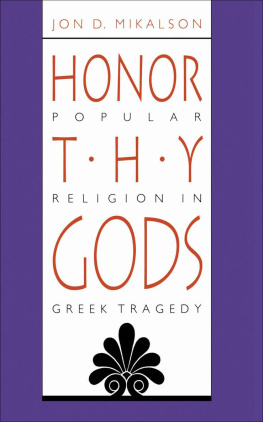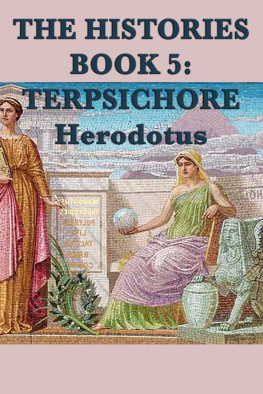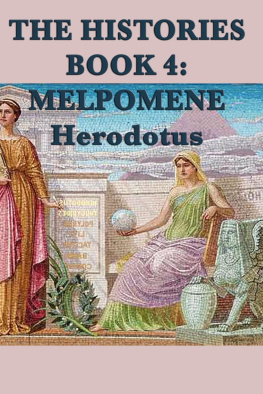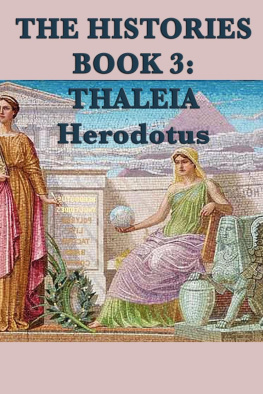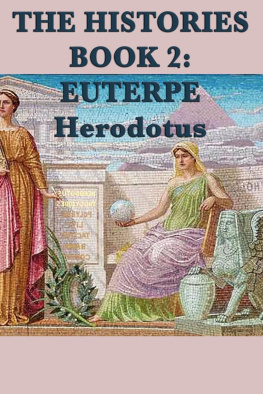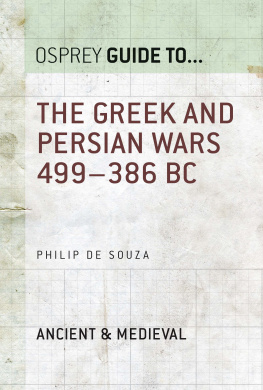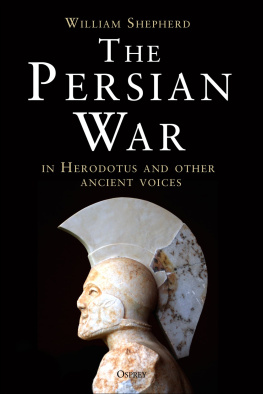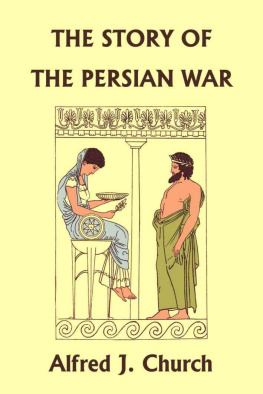Jon D. Mikalson - Herodotus and Religion in the Persian Wars
Here you can read online Jon D. Mikalson - Herodotus and Religion in the Persian Wars full text of the book (entire story) in english for free. Download pdf and epub, get meaning, cover and reviews about this ebook. year: 2003, publisher: Univ of North Carolina Press, genre: Romance novel. Description of the work, (preface) as well as reviews are available. Best literature library LitArk.com created for fans of good reading and offers a wide selection of genres:
Romance novel
Science fiction
Adventure
Detective
Science
History
Home and family
Prose
Art
Politics
Computer
Non-fiction
Religion
Business
Children
Humor
Choose a favorite category and find really read worthwhile books. Enjoy immersion in the world of imagination, feel the emotions of the characters or learn something new for yourself, make an fascinating discovery.

- Book:Herodotus and Religion in the Persian Wars
- Author:
- Publisher:Univ of North Carolina Press
- Genre:
- Year:2003
- Rating:4 / 5
- Favourites:Add to favourites
- Your mark:
- 80
- 1
- 2
- 3
- 4
- 5
Herodotus and Religion in the Persian Wars: summary, description and annotation
We offer to read an annotation, description, summary or preface (depends on what the author of the book "Herodotus and Religion in the Persian Wars" wrote himself). If you haven't found the necessary information about the book — write in the comments, we will try to find it.
Herodotus and Religion in the Persian Wars — read online for free the complete book (whole text) full work
Below is the text of the book, divided by pages. System saving the place of the last page read, allows you to conveniently read the book "Herodotus and Religion in the Persian Wars" online for free, without having to search again every time where you left off. Put a bookmark, and you can go to the page where you finished reading at any time.
Font size:
Interval:
Bookmark:
2003 The University of North Carolina Press
All rights reserved
Designed by Heidi Perov Set in Minion by Tseng Information Systems, Inc.
Manufactured in the United States of America
The paper in this book meets the guidelines for permanence and durability of the Committee on Production Guidelines for Book Longevity of the Council on Library Resources.
Library of Congress Cataloging-in-Publication Data
Mikalson, Jon D., 1943
Herodotus and religion in the Persian Wars / by Jon D. Mikalson.
p. cm.
Includes bibliographical references (p.) and indexes.
ISBN 0-8078-2798-3
1. GreeceHistoryPersian Wars, 500449 B.C.Religious aspects. 2. Herodotus. History. 3. GreeceReligion. I. Title.
BL795.W28 M55 2003
292.08dc21
2002154453
07 06 05 04 03 5 4 3 2 1
,
,
.
AESCHYLUS, Persae 402405
ONE
A Religious Account of the Persian Invasions
TWO
Greek Gods, Heroes, and the Divine in the Persian Invasions
THREE
Some Religious Beliefs and Attitudes of Herodotus
APPENDIX
Herodotus on the Origins of Greek Religion
Mainland Greece
Asia Minor
Attica and Environs
Egypt
The Persian Empire
This project was begun during a most pleasant year as Whitehead Professor at the American School of Classical Studies in Athens in 19951996. Revisiting many of the Persian and Persian War sites under the guidance of John Camp and William Coulson gave considerable inspiration. The staff of the American School did everything to make the year productive and enjoyable. I am grateful for the helpful suggestions of John Dillery, Kevin Clinton, and Robert Garland, who read the manuscript at various stages. As always I owe most to my wife Mary, for expert editorial assistance and especially for her constant support and patience.
Herodotus and Religion in the Persian Wars

Mainland Greece

Asia Minor
The two great Persian invasions of Greece, the one ordered by King Darius and turned back by the Athenians at Marathon in 490 B.C. and the other led by King Xerxes himself and repulsed in 480479 by victories of the allied Greeks at Salamis, Plataea, and Mycale, offer us our very best opportunity from the whole of Greek antiquity to see the interplay of Greek religion and history on a large scale. For a period of ten years, and for somewhat longer if we include the preliminaries to the 490 invasion, we can see how the Greeks internationally, state by state, and sometimes even individually turned to their deities and their religious practices to influence, understand, and commemorate events that threatened their very existence. For this period we have accounts of Greeks praying and sacrificing, making and fulfilling vows to the gods, consulting oracles, interpreting omens and dreams, believing in miracles, pondering pieties and impieties, creating new cults, sanctuaries, and festivals, and making dozens of dedications to their gods and heroesall in direct relation to known historical events. The purpose of this book is to collect and present the abundantly preserved religious aspects of these critical times and thereby set Greek religion into a historical context so as to understand better the role of Greek religion in the Persian invasions and in Greek life in general.
Modern scholarly surveys of Greek religion, such as Walter Burkerts Greek Religion and Martin Nilssons Geschichte der griechischen Religion, collect, abstract from their immediate contexts, and summarize much of the evidence for Greek religion. They have, of course, immeasurable value and have been the primary vehicle for organizing and analyzing this Protean subject. But there is a need also to see the human situations and historical circumstances in which Greeks practiced their religion if we are to understand the place religion had in their lives. The ancient sources, written and archaeological, allow us to do this best for the period of the Persian Wars in early fifth-century Greece. Much that we describe will be familiar to students of Greek religion, but for scholars and for nonspecialists alike it may prove helpful to see these basics of Greek religion placed into social, cultural, historical, and personal contexts.
Herodotus describes Greeks practicing their religionpraying, sacrificing, making dedications, employing various methods of divination, and expressing their thoughtson so many occasions and in such a variety of situations that one can, as I do here, weave his accounts into a general picture of religion of the time. There are, of course, significant limitations in focusing on one author, but these limitations may be counterbalanced by the opportunity to see Greek religion in human, local, and historical contexts as described by one Greek. There is even an advantage that this rich store of religious material is all the product of one man. Herodotus was certainly no ordinary Greek. He was better traveled, more cosmopolitan, more curious, more innovative, and more learned than most Greeks, and it is to these qualities that we owe the Histories. But when we analyze his accounts and views of Greek religion, we find that they are largely in accord with those of other contemporary and later sources for practiced religion. In our concluding chapter we attempt to discover from his writings some of his own religious beliefs and views, but with the knowledge that these were not, or most were not, peculiar to him.
Font size:
Interval:
Bookmark:
Similar books «Herodotus and Religion in the Persian Wars»
Look at similar books to Herodotus and Religion in the Persian Wars. We have selected literature similar in name and meaning in the hope of providing readers with more options to find new, interesting, not yet read works.
Discussion, reviews of the book Herodotus and Religion in the Persian Wars and just readers' own opinions. Leave your comments, write what you think about the work, its meaning or the main characters. Specify what exactly you liked and what you didn't like, and why you think so.


